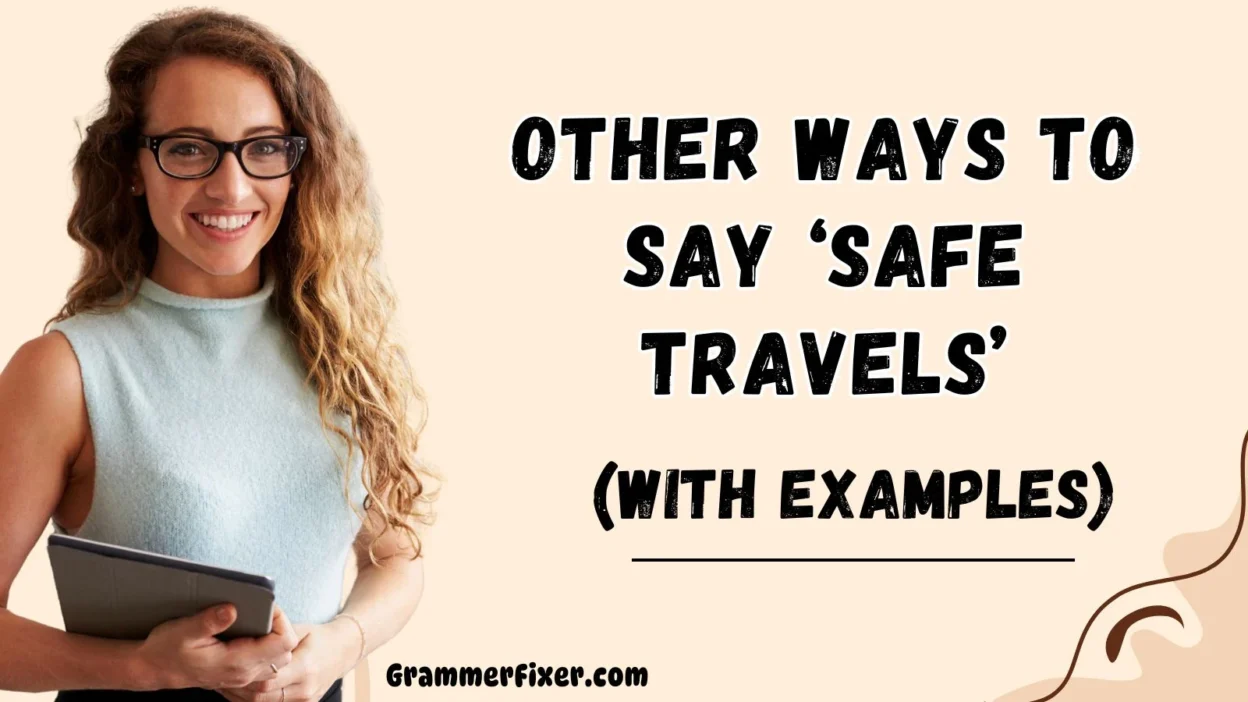When someone you care about is heading off—whether on a vacation, a business trip, or an exciting new adventure—saying “Safe Travels” is a kind and thoughtful way to show you care. But sometimes, you might want to say it in a way that’s more personal, professional, or suited to the situation.
Whether you’re writing a message to a colleague heading to an international conference, a friend embarking on a road trip, or a loved one catching a flight to Tokyo, this list offers 30 heartfelt alternatives to help you express your best wishes with style, warmth, and meaning.
What Does “Safe Travels” Mean?
“Safe travels” is a warm, widely accepted way of wishing someone security, comfort, and good fortune as they head off on a journey. It’s especially common when travel involves potential risks, long distances, or unfamiliar surroundings.
At its heart, this phrase communicates care, concern, and a hope for a smooth, mishap-free experience.
Is It Professional or Polite to Say “Safe Travels”?
Yes—“Safe Travels” is both polite and professional, especially when paired with the right tone. It’s suitable for email sign-offs, farewells, and even client communications, provided the relationship allows for some warmth and friendliness.
However, depending on the context, a more formal, tailored substitute might resonate better—especially in business settings, corporate events, or client visits.
Advantages and Disadvantages of Saying “Safe Travels”
Advantages:
- Shows thoughtfulness and genuine care
- Works in personal and many professional contexts
- Simple and easy to remember
- Universally understood and appreciated
Disadvantages:
- Can feel overused or generic
- May lack specificity or emotional depth
- Might not always fit formal or corporate tone
- Could feel impersonal in highly emotional or significant departures
1. Bon Voyage
Meaning: A French phrase meaning “Have a good trip.”
Explanation: This elegant and classic send-off conveys worldliness and sophistication.
Scenario Example: “Bon voyage! I hope your cruise along the coast brings you the peace you deserve.”
Best Use: Ideal for formal or stylish occasions, travelers with flair, or vacation farewells.
Tone: Elegant, refined, and slightly poetic
2. Wishing You a Smooth Journey
Meaning: Hoping the trip is free from delays, mishaps, or hitches.
Explanation: Emphasizes the ease and comfort of the travel experience.
Scenario Example: “Wishing you a smooth journey—may all your travel documents be in order and your flights be on time!”
Best Use: Great for professional emails, clients, or colleagues.
Tone: Polite, considerate, and professional
3. Have a Safe Trip
Meaning: A more literal variation of “safe travels.”
Explanation: Focuses on security, accident-free transit, and overall well-being.
Scenario Example: “Drive safe, and have a safe trip to the countryside—don’t forget your first aid kit!”
Best Use: Universally applicable—from family to business contacts.
Tone: Warm, practical, and sincere
4. Enjoy the Ride
Meaning: Focuses on the experience, not just the destination.
Explanation: Suggests embracing the joy, freedom, and serendipity of the journey.
Scenario Example: “Enjoy the ride, whether you’re backpacking or just heading on a quick road trip!”
Best Use: Perfect for adventurers, free spirits, or casual settings.
Tone: Upbeat, friendly, and encouraging
5. Have a Pleasant Journey
Meaning: Wishing for a journey that is both comfortable and trouble-free.
Explanation: Conveys a sense of calm, ease, and niceness.
Scenario Example: “Have a pleasant journey—and take in the scenic landscapes along the way!”
Best Use: Excellent for formal settings or email sign-offs.
Tone: Formal, gracious, and respectful
6. Travel Well
Meaning: A versatile phrase wishing someone good health, luck, and security during their trip.
Explanation: It subtly combines safety, comfort, and well-being in two simple words.
Scenario Example: “Travel well, and don’t forget to send pictures from the Caribbean!”
Best Use: Informal emails, text messages, or friendly farewells.
Tone: Concise, friendly, and warm
7. Safe Journey
Meaning: A straightforward, heartfelt wish for a secure and untroubled trip.
Explanation: Slightly more formal than “safe travels,” this phrase is used to express care and concern.
Scenario Example: “Wishing you a safe journey on your cross-country relocation.”
Best Use: Suitable for personal notes, client emails, or professional sign-offs.
Tone: Sincere, universal, and respectful
8. May Your Journey Be Uneventful
Meaning: A humorous or gentle way to say, “May nothing go wrong.”
Explanation: “Uneventful” here is a positive, meaning free from issues, delays, or complications.
Scenario Example: “Have fun in Paris! May your journey be blissfully uneventful.”
Best Use: Casual conversations or among those with shared humor.
Tone: Playful, clever, and genuine
9. Happy Travels
Meaning: Wishing someone joy and pleasure while they travel.
Explanation: Combines cheerfulness with warm wishes, often used in casual farewells.
Scenario Example: “Happy travels! Can’t wait to hear about your hiking trip through the Alps!”
Best Use: Perfect for friends, family, and vacation farewells.
Tone: Upbeat, positive, and light-hearted
10. Take Care on the Road
Meaning: A reminder to be cautious and stay alert while traveling.
Explanation: Emphasizes the safety aspect—especially when traveling by car or through challenging conditions.
Scenario Example: “Take care on the road—those stormy mountain trails can be unpredictable.”
Best Use: Best for road trips, driving, or backpacking advice.
Tone: Concerned, protective, and casual
11. Have a Wonderful Trip
Meaning: Wishing for a memorable and joyful experience.
Explanation: Emphasizes the positive outcomes of the travel—both during and after.
Scenario Example: “Have a wonderful trip to the photography expedition—bring back some breathtaking views!”
Best Use: Appropriate for both professional farewells and personal notes.
Tone: Warm, encouraging, and happy
12. See You When You Get Back
Meaning: A comforting way to say you’ll be here when they return.
Explanation: Adds a reassuring, relationship-driven layer to the farewell.
Scenario Example: “See you when you get back from your business trip to London!”
Best Use: Perfect for colleagues, friends, or family.
Tone: Reassuring, casual, and friendly
13. Wishing You an Enjoyable Adventure
Meaning: A heartfelt wish for a trip full of memories, joy, and experiences.
Explanation: Adds emphasis on exploration, curiosity, and fun.
Scenario Example: “Wishing you an enjoyable adventure! Don’t forget your camera and waterproof pouch.”
Best Use: Ideal for vacationers, backpackers, and young travelers.
Tone: Heartfelt, enthusiastic, and vivid
14. May the Skies Stay Clear
Meaning: Wishing for good weather and smooth air travel.
Explanation: A poetic way to wish someone a trouble-free flight.
Scenario Example: “Have a peaceful flight—may the skies stay clear and the journey hassle-free.”
Best Use: Ideal for air travel, especially long-distance or international trips.
Tone: Poetic, optimistic, and warm
15. Hope Everything Goes Smoothly
Meaning: Wishing that all elements of the trip—from customs to connections—go well.
Explanation: Emphasizes efficiency, organization, and a trouble-free process.
Scenario Example: “Have a great time at the international conference—hope everything goes smoothly!”
Best Use: Common in professional communication and email sign-offs.
Tone: Polished, professional, and cordial
16. Wishing You a Peaceful Voyage
Meaning: Wishing for serenity, tranquility, and a stress-free experience.
Explanation: Works beautifully for long-distance travel or ocean cruises.
Scenario Example: “Enjoy the maritime retreat—wishing you a peaceful voyage and gentle ocean breeze.”
Best Use: Great for leisure trips, spiritual journeys, or retreats.
Tone: Calm, soothing, and elegant
17. May Your Path Be Clear
Meaning: A symbolic wish for obstacles to be removed.
Explanation: Ideal for people starting a new chapter, not just travel.
Scenario Example: “As you head out for your new assignment, may your path be clear and your work productive.”
Best Use: Suitable for career transitions, relocations, or missionary travel.
Tone: Inspirational, motivational, and respectful
18. Have a Relaxing Getaway
Meaning: Wishing someone a restful and rejuvenating trip.
Explanation: Ideal when someone is headed to vacation, spa retreats, or tropical destinations.
Scenario Example: “Enjoy your week off—have a relaxing getaway and unplug from those work emails!”
Best Use: For burned-out coworkers, friends, or family needing renewed energy.
Tone: Empathetic, encouraging, and gentle
19. May You Return Refreshed
Meaning: A kind wish that the traveler comes back with renewed spirit.
Explanation: Communicates genuine care for their well-being and mental health.
Scenario Example: “Best wishes on your vacation—may you return refreshed and full of new insights.”
Best Use: Perfect for colleagues, managers, or friends.
Tone: Supportive, heartfelt, and restorative
20. Have an Inspiring Trip
Meaning: Wishing someone comes back with new ideas, creativity, or perspective.
Explanation: A good choice for people going on retreats, educational trips, or conferences.
Scenario Example: “Have an inspiring trip to Tokyo—your dedication to this project is admirable.”
Best Use: Best for professional peers or mentors.
Tone: Encouraging, motivational, and respectful
21. Safe Travels, My Friend
Meaning: A more personal, affectionate version of the classic phrase.
Explanation: By adding “my friend,” it expresses closeness, trust, and warmth.
Scenario Example: “Safe travels, my friend! Can’t wait to hear about your adventures when you return.”
Best Use: For close friends, trusted colleagues, or even family members.
Tone: Friendly, warm, and personal
22. Travel Light and Bright
Meaning: A poetic way to encourage both minimalism and joyful spirits.
Explanation: Implies both practical preparation (pack light!) and a positive mindset.
Scenario Example: “Travel light and bright—and don’t forget your power bank and passport copies!”
Best Use: Great for free spirits, backpackers, or young travelers.
Tone: Creative, cheerful, and encouraging
23. May You Have a Trouble-Free Trip
Meaning: A wish for smooth logistics, no delays, and no complications.
Explanation: Perfect when you want to emphasize efficiency and careful planning.
Scenario Example: “All packed for the client meetings in Paris? May you have a trouble-free trip.”
Best Use: Professional farewells, especially for business travel.
Tone: Respectful, courteous, and thoughtful
24. Journey Mercies
Meaning: A spiritual phrase asking for divine protection and safety during the trip.
Explanation: Rooted in faith-based communication, often used in Christian circles.
Scenario Example: “We’ll be praying for you—journey mercies and safe arrival at your destination.”
Best Use: For faith-based conversations, missionary trips, or family prayers.
Tone: Spiritual, gentle, and comforting
25. Safe Journey Ahead
Meaning: A more forward-looking version of the classic.
Explanation: Perfect for someone just starting a new life phase, relocation, or long-distance trip.
Scenario Example: “Wishing you a safe journey ahead—Tokyo will love your expertise!”
Best Use: Professional assignments, relocations, or life changes.
Tone: Encouraging, reassuring, and polished
26. May You Collect Beautiful Memories
Meaning: A heartfelt wish for the trip to be emotionally enriching.
Explanation: Emphasizes the joy, stories, and connection found in traveling.
Scenario Example: “From the coastline sunsets to the city lights, may you collect beautiful memories!”
Best Use: Ideal for leisure trips, honeymoons, or family vacations.
Tone: Poetic, warm, and emotional
27. Wishing You an Effortless Trip
Meaning: Hoping the trip is smooth, well-organized, and stress-free.
Explanation: Best for situations involving tight schedules, meetings, or travel logistics.
Scenario Example: “Here’s to an effortless trip—hope your presentation in London is a hit.”
Best Use: Excellent for corporate or professional communications.
Tone: Cordial, professional, and efficient
28. Have a Hassle-Free Flight
Meaning: A very specific wish for air travelers.
Explanation: Focuses on avoiding delays, technical glitches, or airport stress.
Scenario Example: “Have a hassle-free flight—let me know if you need a digital copy of the itinerary.”
Best Use: Perfect for frequent flyers, colleagues, or clients.
Tone: Helpful, supportive, and practical
29. May Your Travels Be Fulfilling
Meaning: A wish for the trip to bring purpose, growth, and satisfaction.
Explanation: A deeper expression—suitable for those traveling for learning, work, or life exploration.
Scenario Example: “Enjoy your countryside photography expedition—may your travels be fulfilling.”
Best Use: Colleagues, mentors, or students on meaningful journeys.
Tone: Thoughtful, reflective, and inspirational
30. Until We Meet Again
Meaning: A poetic goodbye with a promise of reconnection.
Explanation: It acknowledges the parting while offering comfort and hope for reunion.
Scenario Example: “Goodbye for now. Until we meet again, take in that fresh air and live fully.”
Best Use: Ideal for long-distance trips, emotional farewells, or romantic settings.
Tone: Emotional, intimate, and sincere
Conclusion
Finding just the right words when someone is about to leave can mean the world. Whether they’re heading out for a business assignment, an international conference, a family vacation, or a solo hiking adventure, your message can convey more than just politeness—it can offer genuine care, peace of mind, and a sense of connection.
Each of these 30 alternatives to “Safe Travels” brings a different tone, level of formality, and emotional depth. From the elegant “Bon Voyage” to the deeply personal “Until We Meet Again,” you now have a thoughtful vocabulary that can fit professional emails, client farewells, or warm messages to loved ones.
Use these phrases to show your consideration, sincerity, and thoughtfulness, and make every farewell feel a little more meaningful.



